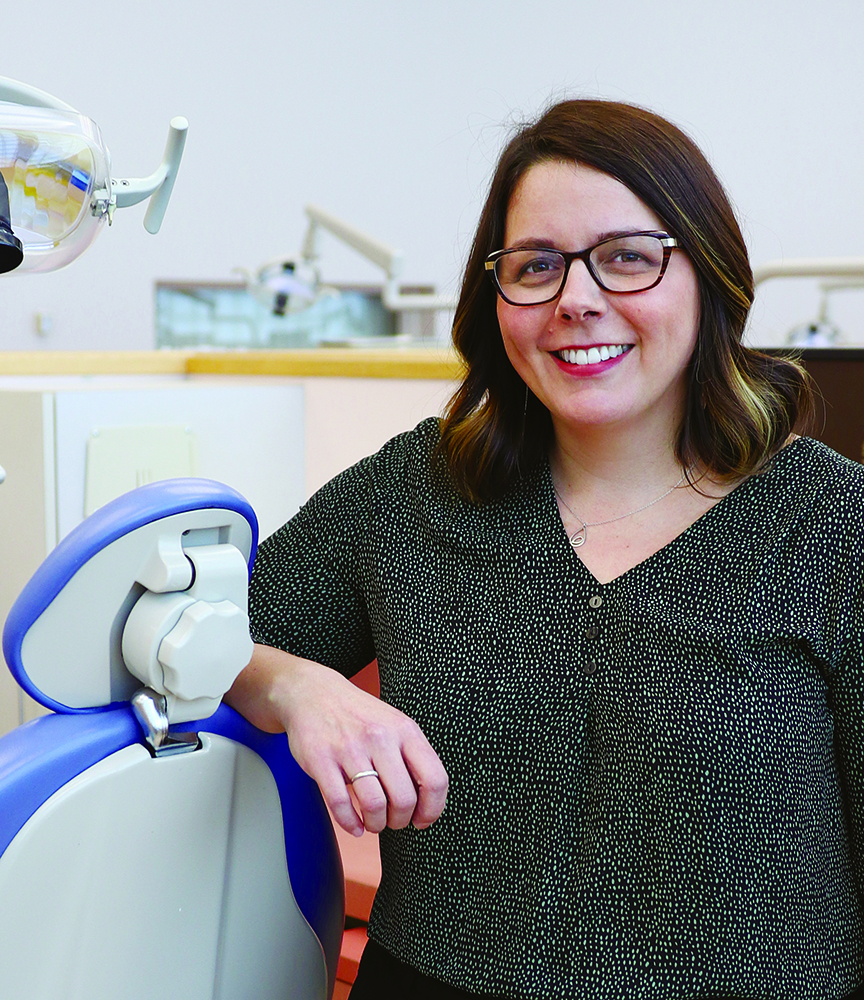
Kathy Yerex [B.Sc./02, Dip.D.Hyg./04, M.Sc./21] would like to see more dental hygienists follow her lead and enter the world of research.
Having more dental hygienists involved in advancing science, she says, would elevate how the profession is viewed by academics and the public.
“It would add more credibility to our profession,” says the assistant professor at the School of Dental Hygiene, who joined UM as a part-time instructor in 2007 and as a full-time faculty member in 2017.
Yerex got her start in research while pursuing her master of science in oral biology at the Dr. Gerald Niznick College of Dentistry.
Her thesis focused on investigating the oral microbiome of people who have tooth resorption – a rare, destructive condition whose causes are not fully understood. Yerex speculated that tooth resorption in humans might be linked to cross-species transmission of oral bacteria from cats.
She found that three bacteria are common to the oral microbiomes of humans and felines with tooth resorption. But more research is needed to determine whether there is a connection between the condition in people and contact with their pet cats.
Yerex’s master’s research opened the door to her current Canadian Institutes of Health Research-funded projects.
She is a principal investigator on two studies related to First Nations and Métis children in Manitoba. One project is looking at kids’ oral microbiome and cavities risk, and the other is about implementing new, culturally informed early childhood oral health programs and services.
“I’m glad that I have these opportunities to do research that will hopefully benefit Métis citizens,” says Yerex, who is a Red River Métis citizen and grew up in Winnipeg.
Yerex, who also pursues research related to the scholarship of teaching and learning, belongs to a group at UM’s dental school that’s looking at the impact of artificial intelligence (AI) on dental and dental hygiene education.
She has a keen interest in using technology in the classroom and has won the dentistry dean’s teaching award for innovative use of tech several times. Currently, she is integrating AI into her teaching methodology by allowing students to use ChatGPT for specific assignments.
“You have to embrace AI,” she says. “It’s not going anywhere.”
Yerex’s varied research interests are apparent from the papers on which she has collaborated. One study, published in the International Journal of Paediatric Dentistry, was a systematic review of cavity risk in children under six.
Another that appeared in the International Journal of Molecular Sciences focused on the molecular mechanisms that make three pathogenic bacteria resistant to antibiotics.
A study in BMC Oral Health discussed novel approaches for treating periodontal disease, including the possibility of improving the oral microbiome through microbiota replacement therapy or probiotic therapy.
While Yerex’s scholarly interests are diverse, she would like to develop more expertise in one area and is considering a PhD. Still, she says, the variety has been an advantage because it informs her teaching.
“I feel that my research has helped me become a better educator, because it’s not just me talking about information from a textbook. I’m sharing real lived experience.”
BY MATTHEW KRUCHAK
